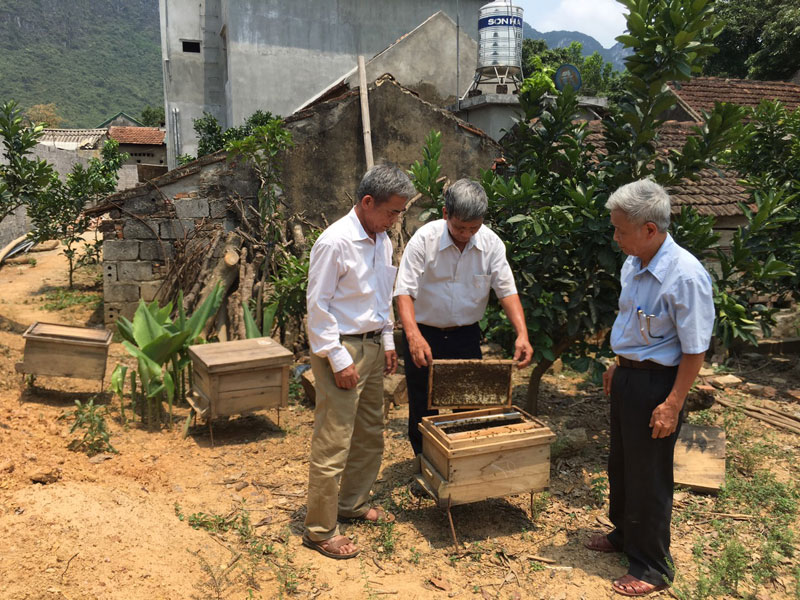
(HBO) – Half of Lac Thuy district’s forest areas of 19,100 hectares are cultivated with longan, litchi and other perennial trees, which serves as a good ground for the development of honey and bee sector. Bestowed with favourable weather conditions, Lac Thuy district has gained high economic efficiency from apiculture. Thanks to its high quality, local honey has met the taste of the market and become the main source of income of many households.
 Duong Van Uu’s family in Hong Phong
village, Yen Bong commune, is now having 200 be swarms of bees. Last year, his
family earned 200 million VND from 2,000 litres of honey.
Duong Van Uu’s family in Hong Phong
village, Yen Bong commune, is now having 200 be swarms of bees. Last year, his
family earned 200 million VND from 2,000 litres of honey.
Duong Van Uu’s family in Hong Phong village, Yen Bong commune, began the job in
1972 and now they are having 200 swarms of bees which generate some 2,000
litres of honey each year. The family earns an average of over 200 million VND
from selling the honey.
Uu said that beekeeping is not difficult but it requires keepers’ carefulness
and deep understanding of the bees’ habitat like bee swarm season and foraging
season as well as various kinds of flowers. Longan, litchi, acacia and eucalyptusare best for bees with honey production.
Foraging season is between February and July, particularly from May, households
harvest honey two or three times a month. Meanwhile, when nectar becomes scare
in the cold season, beekeepers should work to prevent absconding, he said.
With more than 40 years of experience in beekeeping, Ha Huu Huong in Zone 7,
Chi Ne town, has 50 swarms of bees. Last year, he harvested 500 litres of honey
and gained 100 million VND.
"Choosing queen bees is of utmost
importance as they play a decisive role in developing a healthy swarm and
producing high-quality honey. Disease prevention should get due attention. Gearing
towards clean products, our honey has been favoured by many traders. As each
litre of honey is sold at 160,000 VND, our family earn over 100 million VND
each year”, he said.
According to Hoang Dinh Chinh, deputy head of the Lac Thuy district’s bureau of
agriculture and rural development, the trade is not new in Lac Thuy. It was developed
in a small scale, then the model is widened widely thanks to its economic
efficiency. Taking advantage of the forest land, local people have rushed to
farm bees, with 500 households keeping 10,000 swarms. Each year, the district
harvests 120 tonnes of honey and gains over 20 billion VND.
Many people have shifted to beekeeping as this job does not require to big investment
but brings about a stable income. However, it requires high techniques and
carefulness in each stage.
Beekeeping is potential for local economic development, making significant
contributions to the alleviation of poverty and improvement of local livelihoods.
Therefore, Lac Thuy district has worked to encourage local farmers to develop
the bee swarms while planting more forests to create food for bees. Apiculture
is well developed in Yen Bong and Khoan Du commune, and Chi Ne town.
In a bid to make beekeeping as a spearhead in the local economy, local
authorities should give more support to the farmers so that they can develop a sustainable
model and build Lac Thuy honey brand./.
Dao Village’s honey – a product certified with a 3-star OCOP (One Commune One Product) rating by Thong Nhat Agricultural Cooperative in Dao Village (Hoa Binh City) – is highly regarded by consumers for its quality, richness, and variety in packaging. The distinctively sweet taste of Dao Village’s honey leaves a lasting impression on anyone who has tried it.
In alignment with Project No. 07-DA/TU, issued by the Hoa Binh provincial Party Committee on November 1, 2021, Lac Thuy district has actively promoted investment and supported the sustainable development of its industrial and handicraft sectors during the 2021–2025 period. Alongside this, the district has remained committed to preserving and revitalising traditional craft villages.
Located in the northern part of Lac Thuy district, with a temperate climate and fertile soil, Phu Thanh commune has great potential and advantages in growing tea. The long-standing experience, combined with strict adherence to organic farming practices in the tea gardens, ensures that the dried tea products from Phu Thanh and Lac Thuy as a whole are sold out immediately upon production, providing a stable and prosperous life for the local people.
Amid efforts to streamline the administrative apparatus, Hoa Binh province has intensified measures to address challenges in land clearance, resettlement support, and infrastructure investment, aiming to speed up the progress of key projects.
Hoa Binh province has posted an unprecedented economic growth rate of 12.76% in the first quarter of 2025, marking its highest quarterly performance to date and positioning it as the second fastest-growing locality in the country, trailing only Bac Giang province.
Under current regulations, products in the One Commune – One Product (OCOP) programme that are rated three stars or higher must undergo re-evaluation every three months. However, in reality, some of these products fail to consistently meet the required standards, raising concerns about the sustainability of their OCOP certification. This underscores the urgent need for producers to enhance product quality and gradually develop their OCOP products into strong, marketable brands.



 Duong Van Uu’s family in Hong Phong
village, Yen Bong commune, is now having 200 be swarms of bees. Last year, his
family earned 200 million VND from 2,000 litres of honey.
Duong Van Uu’s family in Hong Phong
village, Yen Bong commune, is now having 200 be swarms of bees. Last year, his
family earned 200 million VND from 2,000 litres of honey.